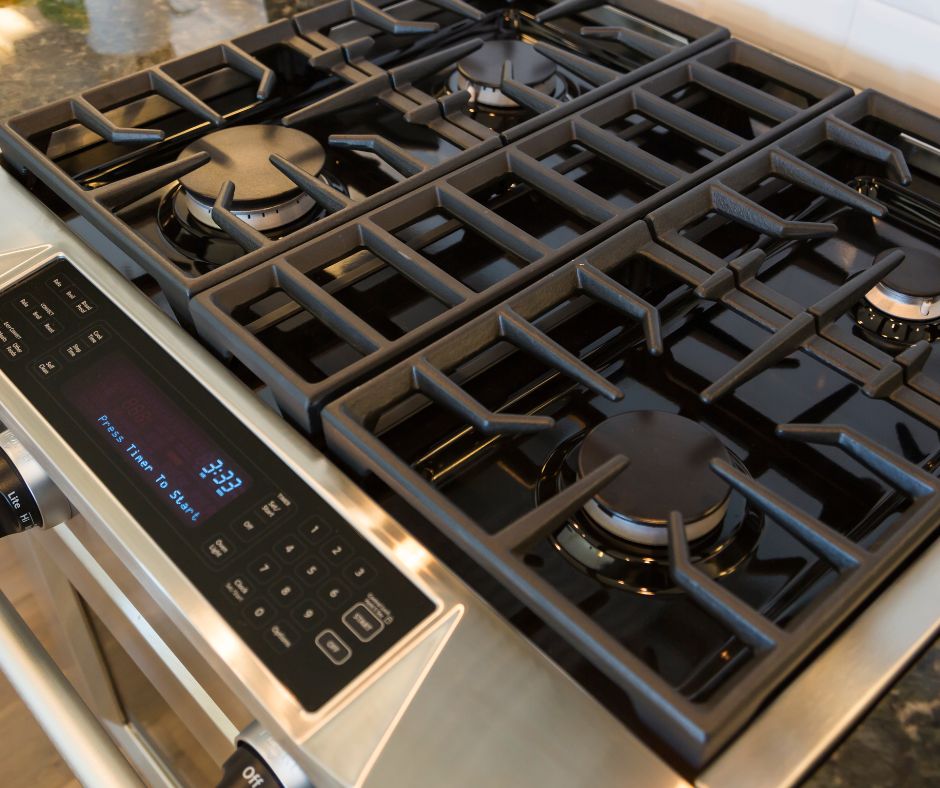Every home has a stove for all of your cooking needs but not every stove is made the same. The greatest kitchen debate revolves around gas vs. electric. This truly comes down to personal preference. To decide on your preferences, you might want to take a look at the benefits of both options. You may run across a different range than you wanted as you begin your home search, so keep an open mind.
Gas vs. Electric Range
Benefits of a Gas Range
A Gas range stove is typically the favored cooking range. Well-renowned chefs prefer gas ranges. A gas range needs to be connected to a gas line for the flame to be produced. Gas ranges require you to be comfortable cooking with an open flame. This open flame can be adjusted in an instant giving you a lot of cooking control.
A gas range can also cut out cookware if you are using a flat top. Open flames can reach around the sides of a pan or wok allowing you to grill or char food. As soon as you turn a burner off, the flame is gone so the temperature response is immediate. Gas will light and heat faster than electric so you can expect your oven to preheat faster.
Benefits of an Electric Range
An electric range is a flat surface that has heat coils inside and will heat up and transfer that heat to cookware. The surface is usually made of a ceramic and glass blend. These ranges require a 220 or 240-volt outlet and most kitchens already have these. Gas ranges do get more attention but electric ranges can be used effectively in professional and home kitchens. Electric ranges can cycle on and off quicker than most gas ranges.
This means there is a greater response to temperature settings and it’s quicker when there is heat loss in the oven. Electric heat is a dryer heat than gas and this is preferred when you are working towards a desired crisp on certain dishes. Electric ranges usually offer different ring sizes so you can use a variety of cookware at once as well as different cooking zones on one stovetop. Cleaning an electric stovetop is a breeze compared to the gas range. You are cleaning one surface and there are no extra corners or crevices to work around.

In Conclusion
Both stove types are excellent choices and it all depends on your cooking preferences. This can sometimes be a big deal to buyers when they are looking for their dream home. Don’t let the “wrong” range keep you from a home you love, but do your research so you know if it is possible to switch out. Remember a gas range needs a gas line and an electric range needs a 220 or 240-volt outlet. No matter what your preference is, keep an open mind. There are wonderful benefits to cooking with both range types.
For more information on ways to save energy, or for other heating and cooling needs, contact us at Pilchuck Heating.
Get a Quote Today
More Advice for Homeowners
- How Can I Make My Home More Efficient?
- Is a Home Energy Audit Worth it?
- Difference Between an Air Conditioner and a Heat Pump
- What Does Energy Star Mean?
- What Does HVAC Mean?
- How to Heat Your House for Less
- What is the Most Effective Thermostat Setting?
- How to Protect Your Heat Pump During a Storm
- What You Should Know About CO
- Do I Need a Backup Furnace?
- What is a Mini-Split System?
- Top Ways to Save on Your Heating Bill
- How to Declutter Your House


